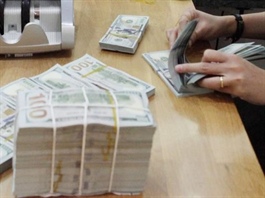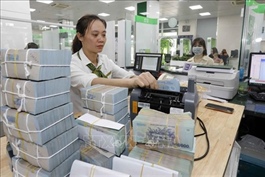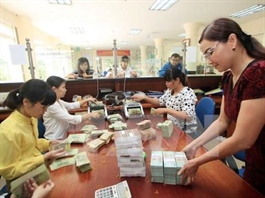SBV’s bill issuance is not a signal of monetary policy reversal
SBV’s bill issuance is not a signal of monetary policy reversal
The State Bank of Vietnam (SBV)'s issuance of bills is not a signal of monetary policy reversal, but there is only limited room for the SBV to further loosen monetary policy, and this is not positive news for the stock market at the end of this year, analysts forecast.

Headquarters of the State Bank of Vietnam (SBV) in Hà Nội. After the Fed's recent meeting, the SBV resumed bill issuance worth nearly VNĐ111 trillion. — Photo sbv.gov.vn |
In a recent report, Viet Dragon Securities Company (VDSC)’s analysts said that although the possibility of the US Federal Reserve (Fed) implementing another interest rate hike is still open, given that the US core personal consumption expenditure (PCE) index in August cooled to 3.9 per cent, the Fed’s decision to maintain the high interest rate for the next two years is unfavourable information for the SBV’s exchange rate management, especially when there is a contrast in monetary policy between the SBV and the Fed.
After the Fed's recent meeting, the SBV resumed bill issuance. As a result, the accumulated net withdrawal value through bill issuance as of October 3, 2023 reached nearly VNĐ111 trillion. Overnight interbank interest rates and T-bill interest rates have begun to increase to 0.55 per cent and 1.18 per cent, respectively, according to the SBV’s latest data.
VDSC’s analysts believe that this development, along with the expectation of accelerated credit growth at the end of the year, may help narrow the interest rate gap between the Vietnamese đồng-denominated and the US dollar-denominated savings. With the exchange rate having increased by 3.5 per cent since the beginning of the year, the analysts do not expect interest rate arbitrage activities to create additional pressure on the exchange rate.
However, they noted, in the most negative scenario where the US dollar index (DXY) increases beyond 110, the SBV may have to intervene by selling the dollar, combined with a net withdrawal on the T-bill channel. This could worsen investment sentiment due to concerns about deeper changes in the SBV’s monetary policy management.
The analysts believe that the SBV's issuance of bills is not a signal of policy reversal when economic growth is still low at 4.24 per cent in the first eight months of 2023 and inflation remains under control.
However, they noted, the room for further loosening of monetary policy is relatively limited, and this is not positive news for the stock market in the year-end period.
In a recent report, Saigon Securities Company (SSI)’s research division also stated that the SBV's move to issue bills is a way to adjust the short-term liquidity situation in the banking system. The bill issuance is also a common activity from central banks and doesn't signify a change in the SBV’s monetary policy. The SBV’s purpose is merely to withdraw liquidity in the interbank market to reduce pressure on exchange rate speculation in the short term.
In fact, the sentiment of investors in the stock market has quickly changed, reflected in the sharp decline in market liquidity. Specifically, cash flow in the industry groups, including real estate, securities, and public investment, which led investors’ sentiment in the past period, has shown clear signs of weakening.
This movement further reinforces VDSC’s view that the market's broad upward trend, based on policy effects since May, will gradually transition to a more sideways trend, as mentioned in the VDSC report.

























